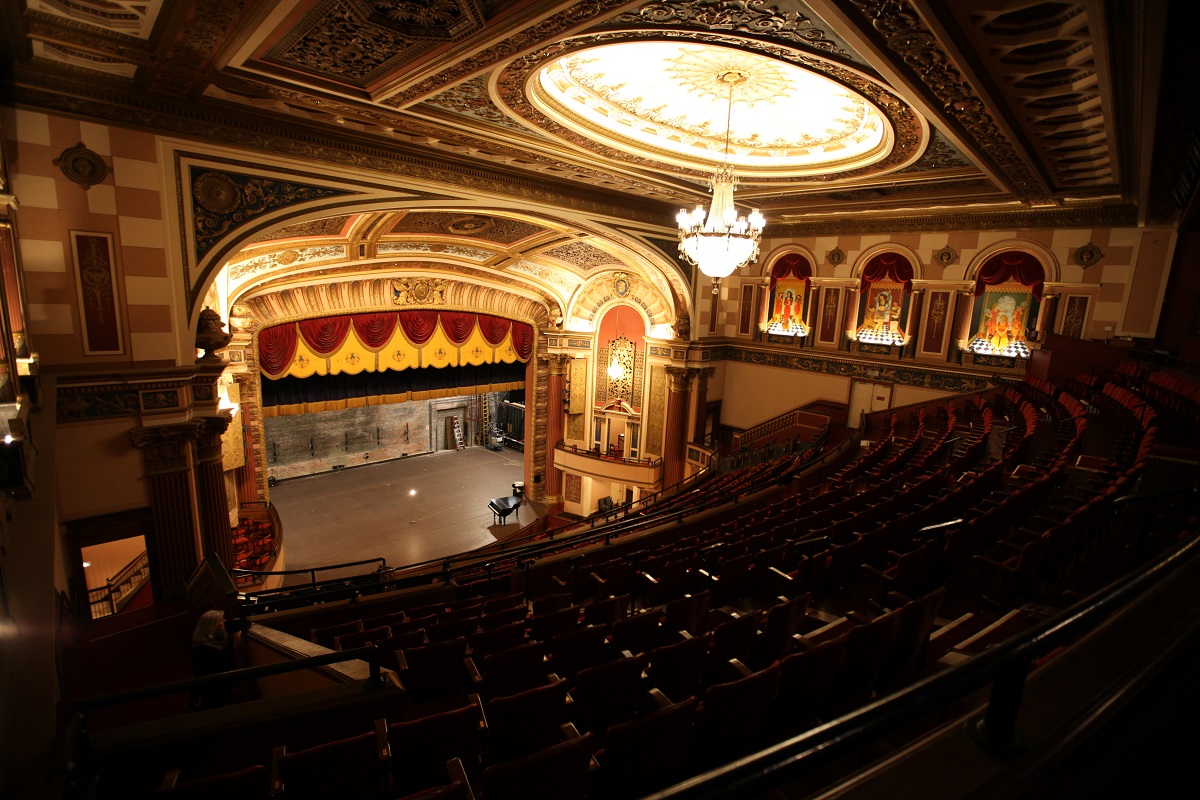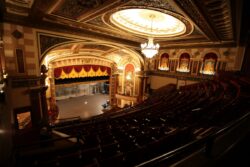Summer 2021
Resetting the Stage
When audiences eventually return to the Official State Theatre of Louisiana, they’ll find it better off than it’s been in a long time
Published: May 28, 2021
Last Updated: June 1, 2023

Photo by Chris Jay
The polished-up and deep-cleaned Strand Theatre awaiting the return of patrons.
The Strand opened to the public as a vaudeville venue on July 3, 1925, at 619 Louisiana Avenue in Shreveport. Pharmacists and brothers Julian and Abe Saenger of Shreveport partnered on the project with Simon and Harry Ehrlich, a pair of Texarkana-based brothers who managed opera houses throughout the Southwest. The Strand, marketed as “the Million Dollar Theatre” by Saenger-Ehrlich Enterprises, is often regarded as the flagship theatre of the Saenger empire, which grew to include 320 venues throughout the Deep South.
The Strand followed a path similar to those of other vaudeville-era theatres around the country. When talking-picture films were introduced in 1927 the Strand adapted to the changing times, functioning as a single-screen movie theatre until its closure in 1977. Later that year ABC Interstate Theatres donated the building to a newly formed not-for-profit that would raise the funds to restore it to its original grandeur.
The Strand reopened on December 21, 1984, as a not-for-profit venue for touring Broadway musicals as well as dance troupes, jazz orchestras, pop music performances, and more. For thirty-five uninterrupted seasons, programming at the Strand has largely reflected the tastes of Strand supporters and ticket-buyers, who expect to see well-known Broadway shows and family-friendly live entertainment.
Jenifer Hill is a veteran arts administrator who has served as executive director of the Strand since 2014. She minces no words when it comes to the challenges of operating a not-for-profit performing arts center that is not bankrolled by a municipal government, arts council, or university. “Shreveport loves a big Broadway show, but those are expensive,” Hill said. “Since we own the building, we can’t afford to lose money. If we can’t sell a show, we can’t bring it.” Describing the organization’s recent history, she noted, “We’ve changed a bit on what kind of shows we bring in and how we market them. But what I’m most proud of is that we’re out of debt. There were two tax liens on this building, and they’re gone.”
There was also a failing roof on the building, which was replaced at a cost of half a million dollars in 2015. The building’s ancient heating and air conditioning system was also recently replaced, a wheelchair lift was added backstage, the boiler in the basement was replaced, all of the backstage curtains and drapery were updated, a new assistive listening system for hearing-impaired guests was installed, and—with a grant from Southwestern Electric Power Company—all 1,700 of the building’s lights were updated to LED bulbs in 2018.
In order to make it easier to network with donors during events, Hill championed the creation of the Chandelier Room in 2019. Previously, Strand staff and board members would spend intermissions roaming the building in search of VIPs. Now, they gather in the Chandelier Room to spend invaluable face-to-face time with donors. “It gives me a chance to work the room,” Hill said of the new hospitality suite. “Before, it was just a storage room filled with old boxes.”
All of the Strand’s staff except for Hill were furloughed during the COVID-19 pandemic. Climbing the marble stairs to her office, she pointed out that the stairs are cleaner than they’ve been in decades, since she spent several days on her hands and knees scrubbing each individual stair. Hill is planning to announce details of the Strand’s thirty-sixth season in June and to resume live performances in September. Though she is customarily tight-lipped about unannounced shows, Hill said that early highlights of the planned season include performances by Chicago’s Second City comedy troupe, unconventional cover band Postmodern Jukebox, and “live scoring” group The Queen’s Cartoonists.
When audiences return to the Strand, they may find that the place seems a little brighter, that the hot water reaches the balcony restrooms, and that even the stairs leading towards the administrative offices shine in a way that they haven’t in ages. That evening cannot come soon enough for Hill. “This place is very, very different when it’s empty,” she said. “Being able to welcome our people back is going to mean so much.”
Chris Jay is a freelance writer based in Shreveport, where he publishes the local food and drink blog Stuffed & Busted. He recently launched a podcast, Once Upon a Time in Shreveport, which explores the history of northwestern Louisiana.
